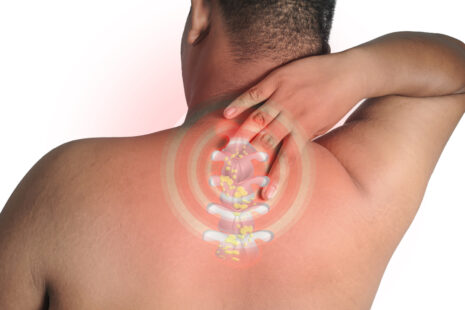Distinguishing between back pain caused by a disc issue and back pain originating from a muscle strain can be challenging, as the symptoms can sometimes overlap. Yet, certain characteristics and patterns may help you differentiate between the two…
Back Pain from Muscle Strain
- Location of Pain – Muscle-related back pain is often localized to a specific area of the back. The pain is generally felt in the muscles themselves and may be tender to touch.
- Pain Triggers – Muscle strain is commonly associated with activities that involve lifting, bending, or sudden movements.
- Muscle Spasms – Muscle-related back pain may be accompanied by muscle spasms, where the muscles contract involuntarily, leading to additional discomfort.
- Pain Relief – Rest and gentle movement usually provide relief for muscle-related back pain.
- Onset of Pain – Muscle strain pain often develops immediately after an injury or overexertion.
Back Pain from a Disc Issue
- Radiating Pain – If the pain extends beyond the back and travels down the leg, it is known as radicular pain. This type of pain is more indicative of a disc issue, as the herniated or bulging disc can compress spinal nerves, causing pain, tingling, or numbness in the leg.
- Pain with Movement – Certain movements, such as bending forward, twisting, or coughing, may aggravate disc-related back pain.
- Weakness or Numbness – A disc issue can lead to weakness or numbness in the leg or foot due to nerve compression.
- Pain Relief – Rest may not alleviate disc-related back pain, and sometimes, lying down or sitting can make the pain worse. Changing positions or walking may provide temporary relief.
- Gradual Onset – Pain from a disc problem can develop gradually over time.
Keep in mind that these are general guidelines, and it’s crucial to seek a proper diagnosis from a healthcare professional. A doctor, orthopedic specialist, or spine specialist can perform a physical examination, review your medical history, and order imaging tests (such as X-rays or MRI) if necessary to accurately diagnose the cause of your back pain.
Once the cause of your back pain is identified, an appropriate treatment plan can be developed. Treatment options may include rest, physical therapy, pain management techniques, medication, and in some cases, surgical intervention for severe disc issues. Early diagnosis and proper treatment can lead to better outcomes and faster recovery from back pain.




